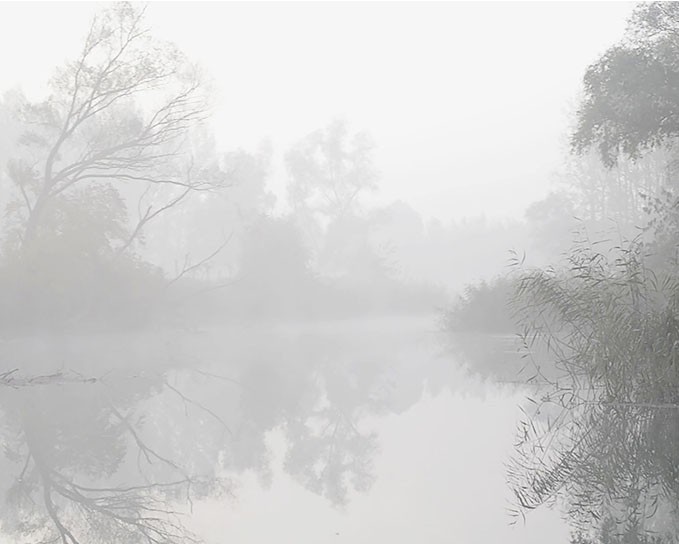
POLITZÁLT TÁJ
KÍSÉRŐPROGRAMOK
2016 április 28
Finisszázs
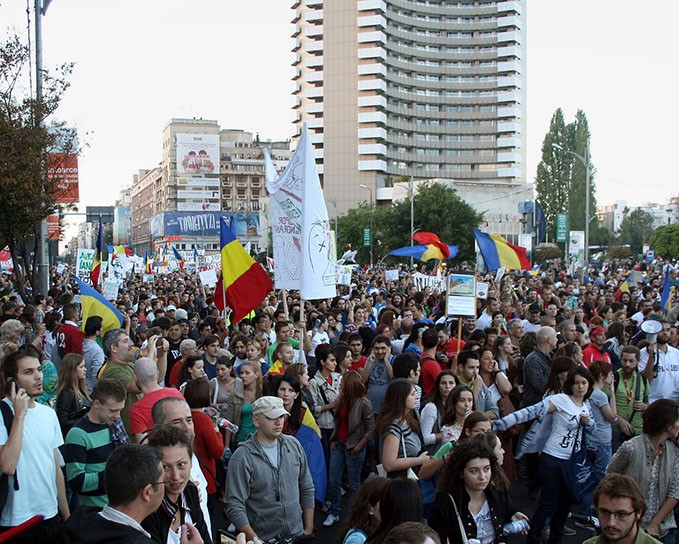
2016 március 18, 18:30
Tamara Steger előadása
[CEU, Environmental and Social Justice Action Research Group]
What Happened to Environmental Justice?
Transition and Transformation in Central and Eastern Europe
moderátor: Axel Braun
Az esemény Axel Braun VALAMILYEN ELLENZÉK című kiállításához
kapcsolódó POLITIZÁLT TÁJ rendezvénysorozat része
Blinken OSA Archívum
Arany János utca 32
5051 Budapest
Tamara Steger's presentation contextualizes environmental justice in CEE under state socialism leading up to 1989 and during post-socialist transformation with EU enlargement and the introduction of multi-party parliamentary regimes and liberalization driven by a neoliberal framework (e.g., privatization and marketization). Almost 20 years after the collapse of the former Communist Party based regimes, Central and Eastern Europe has become part of the global market and struggles for environmental justice that once confronted the former Soviet-style “massive industrialization project” under state socialism are now confronted with the complexity of various alliances puppeteering financialization mechanisms associated with domestic and international capital and the political parties assumed to represent their interests.
ABOUT ENVIRONMENTAL JUSTICE
An environmental injustice exists when members of a disadvantaged, ethnic, minority or other groups suffer disproportionately at the local, regional (subnational), or national levels from environmental risks or hazards, and/or suffer disproportionately from violations of fundamental human rights as a result of environmental factors, and/or denied access to environmental investments, benefits, and/or natural resources, and/or are denied access to information; and/or participation in decision-making; and/or access to justice in environment-related matters .
(Steger, T. (ed.) (2007). Making the case for environmental justice in Central and Eastern Europe. Brussels: Central European University, Center for Environmental Policy and
Law (CEPL), (Budapest, Hungary) & the Health and Environment Alliance (HEAL).: 10).
ABOUT TAMARA STEGER
Tamara Steger is an Associate Professor in the Department of Environmental Sciences and Policy at Central European University (CEU) in Budapest, Hungary. She is the founder of the Environmental Justice Program (est. 2003) of the Environmental and Social Justice Action Research Group (ACTJUST) at CEU. Her work has involved pioneering case study research on environmental justice in Central and Eastern Europe (CEE), and articulating a policy and legal oriented framework for promoting environmental justice in CEE. She has also been involved in social movement research on the OCCUPY movement, the anti-fracking movement, Critical Mass, and Climate Justice.
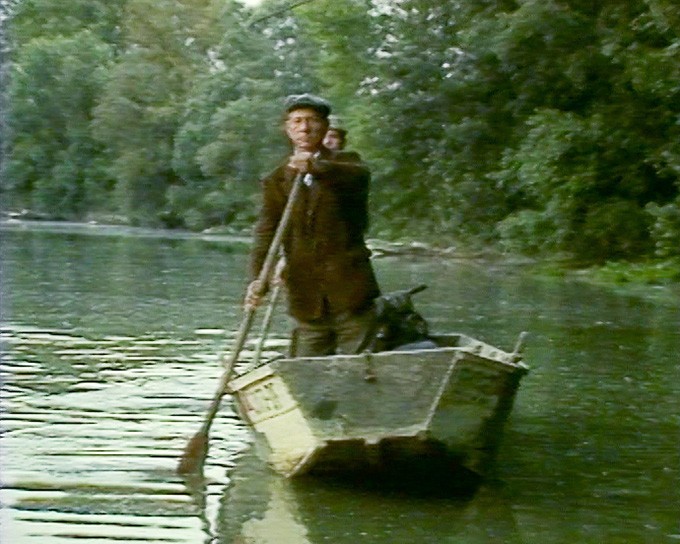
2016 március 23, 18:30
Filmvetítés: CSILLAG ÁDÁM “Dunaszaurusz” (1988)
beszélgetés Csillag Ádám filmrendezővel és Vargha Jánossal a Duna Kör alapítójával
(magyarul) moderátor: Nagy Szilvia
A filmvetítés Axel Braun VALAMILYEN ELLENZÉK című kiállításához
kapcsolódó POLITIZÁLT TÁJ rendezvénysorozat része
Blinken OSA Archívum
Arany János utca 32
5051 Budapest
A "Dunaszaurusz" a Bös-Nagymarosi Vízlépcsőrendszer problémáinak átfogó ábrázolásával egyszersmind a magyarországi diktatórikus társadalmi berendezkedés csődjét is bemutató dokumentumfilm. A film - túllépve egy-egy film szokásos hatóerején -- drámai erővel mutatta be a tervezett dunai vízerőmű körüli ökológiai, társadalmi problémákat, a demokratizmust gátló tényezőket és a rendszerváltást megelőző civil kurázsi kialakulását, megjelenését. (1988-ban a kritikusok a legjobb dokumentumfilmnek tartották.) Egy szocialista óriás-beruházás várható természet és környezetromboló hatásának bemutatása mellett, feltárja a szocialista állam működésének diktatórikus vonásait, ütköztetve a rendszerváltást megelőző időszak legfontosabb társadalmi megmozdulásait szervező Duna Kör tagjainak tevékenységével. A film a sajtóban, 1985-ben párthatározattal betiltott témát, a Bős – Nagymarosi Vízlépcsőrendszer történetét követi nyomon, megszólaltatva az elhallgattatott tudósokat, az illegalitásban szervezkedő környezetvédőket.
Keletkezésének időszakában 1984-1988-ig a témával kapcsolatos hírzárlat volt érvényben. A „Dunaszaurusz”-t elkészültét követően betiltották, a filmszemlén nem kerülhetett versenybe, de egy az országgyűlési képviselők és a nyilvánosság számára rendezett vetítés után amelyen több százan vettek részt, a Parlament Környezetvédelmi Bizottsága sikerrel javasolta a miniszterelnöknek a nagymarosi vízlépcső építésének leállítását. A filmet társadalmi nyomásra és egy per megnyerése után, a Magyar Televízió 1989 tavaszán mutatta be. A film címe állandó jelzőként honosodott meg a hazai és nemzetközi politikai és sajtónyelvben a Bős-Nagymarosi Vízlépcsőrendszer megnevezésére.
Csillag Ádám
Csillag Ádám a kortárs magyar dokumentumfilmezés kiemelkedő alakja.
1984-ben fejezte be a Színház és Filmművészeti Egyetemen s azóta lankadatlanul készíti dokumentumfilmjeit – húsz éve dolgozik a pályán. A diploma átvétele után bekapcsolódott a Balázs Béla Stúdió műhelymunkájába, ahol 1984-1988-ig készítette első dokumentumfilmjét, a revelatív hatású "Dunaszaurusz"t. 1989-től dolgozott a Magyar Televízió több szerkesztősége számára. Kamerájával jelen volt a prágai "Bársonyos Forradalom" eseményein, a csehszlovák kommunista rezsim bukásánál. 1990-tõl részt vett az MTV Opál produceri irodában indult emberi-jogi, kisebbségi és társadalmi- szociális magazinok kialakításában és fejlesztésében. Csillag Ádám, a Magyar Film és TV Művészek Szövetsége etikai bizottságának és a Duna Kör Elnökségének tagja.
Vargha János
Környezetvédő és fotográfus. 1977-ben szerzett biológus diplomát a szegedi József Attila Tudományegyetemen. 1981-től publikál és előadásokat tart a vízgazdálkodás és vízépítés környezetvédelmi vonatkozásairól. A Duna Körnek alapító tagja, amely 1985-ben megkapta a Right Livelihood Award-ot, az alternatív Nobel-díjat. Az 1977-ben megjelent A hágai döntés című, a hágai Nemzetközi Bíróságnak a bős–nagymarosi vízlépcsőrendszer ügyében hozott döntésről szóló könyv szerkesztője és a Vízerő és politika című fejezetének szerzője. 1998-2000 között a magyar kormány környezetpolitikai főtanácsadója volt.
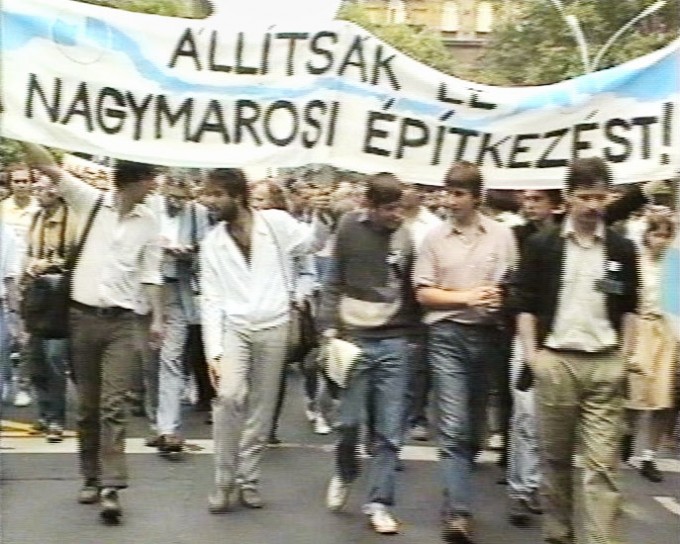
2016 március 30, 18:30
Filmvetítés: FEKETE DOBOZ “A Műtárgy” (1988)
beszélgetés Elbert Márta filmrendezővel és Csillag Ádám filmrendezővel
(magyarul) moderátor: Nagy Szilvia
A filmvetítés Axel Braun VALAMILYEN ELLENZÉK című kiállításához
kapcsolódó POLITIZÁLT TÁJ rendezvénysorozat része
Blinken OSA Archívum
Arany János utca 32
5051 Budapest
Az este során a videófolyóirat második kiadványa, A Műtárgy (I. évf. 2. szám) kerül
bemutatásra.
A Fekete Doboz videós műhelyt 1987-ben alapította Ember Judit, Elbert Márta,
Jávor István, Lányi András és Vági Gábor. A videófolyóiratként létrehozott videódokumentációs
műhely a VHS formátumot használta a szamizdat kiadványihoz.
Civil szervezetként nyomon követték a rendszerváltást, dokumentálták az Ellenzéki
Kerekasztal tárgyalásait.
Az 1988 nyarán készült összeállítás bemutatja a Bős-Nagymarosi Vízlépcső elleni
első tömegtüntetést, a dunai táj legszebb részeinek fokozatos átalakulását sivár
pusztasággá, régészek mentőakcióját az elárasztásra ítélt területeken, valamint az
Egyesült Államokból hazalátogató Lipták Bélával készült interjút, amelyben a professzor
összefoglalja az építkezés ellen szóló érveket.
A filmvetítést megelőzően Elbert Mártával és Csillag Ádámmal beszélgetünk a kor
politikai és társadalmi események dokumentációs lehetőségeiről a múltban és
napjainkban, a domentum-aktivista hozzáállásról, illetve a szabad felhasználású
fényképek és filmek szerepéről a demokratikus társadalmi megmozdulásokban,
véleménnyilvánításban.
ELBERT MÁRTA
A Filmgyárban eltöltött húsz év felvétel-és gyártásvezetés után 1987-ben a Fekete
Doboz egyik alapító Szerkesztője. A rendszerváltás legfontosabb politikai és társadalmi
eseményeinek videós rögzítője, itthon és Kelet-Európa szocialista országaiban.
Az Ellenzéki és a Nemzeti Kerekasztal-tárgyalásokon készített Felvételekből
öt részes film szerkesztője. A Fekete Doboz közel 130 filmjének szerkesztője,
riportere, producere. A Roma Média Iskola alapító tanára, az ELTE előadója. Pulitzer
Emlékdíj.
CSILLAG ÁDÁM
1984-ben fejezte be a Színház és Filmművészeti Egyetemen s azóta lankadatlanul
készíti dokumentumfilmjeit – több mint harminc éve dolgozik a pályán. A diploma
átvétele után bekapcsolódott a Balázs Béla Stúdió műhelymunkájába, ahol 1984-
1988-ig készítette első dokumentumfilmjét, a revelatív hatású "Dunaszaurusz"t.
1989-től dolgozott a Magyar Televízió több szerkesztősége számára. Kamerájával
jelen volt a prágai "Bársonyos Forradalom" eseményein, a csehszlovák kommunista
rezsim bukásánál. 1990-tõl részt vett az MTV Opál produceri irodában indult
emberi-jogi, kisebbségi és társadalmi- szociális magazinok kialakításában és
fejlesztésében. Csillag Ádám, a Magyar Film és TV Művészek Szövetsége etikai
bizottságának és a Duna Kör Elnökségének tagja.
Filmvetítés: Fekete Doboz “A műtárgy” (1988)
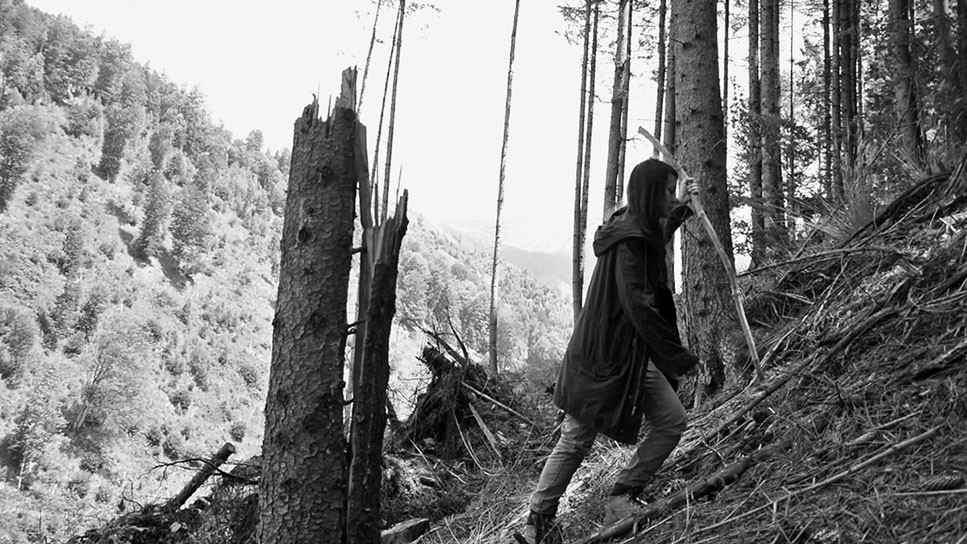
2016 március 31, 18:30
MAJA & REUBEN FOWKES előadása
(Translocal Institute)
Walking without footprints
Moderátor: Axel Braun (angolul)
Az esemény Axel Braun VALAMILYEN ELLENZÉK című kiállításához
kapcsolódó POLITIZÁLT TÁJ rendezvénysorozat része
Blinken OSA Archívum
Arany János utca 32
5051 Budapest
To walk in the landscape today is to do so with awareness of the anthropogenic transformation of the natural world, while walking in the urban environment synchronises the rhythm of our steps with the great acceleration of the high-tech city. This talk investigates how in today’s twenty-four seven culture, where minimising time and maximising speed is a prerequisite, the choice to move through the world at a pace of five kilometres an hour could create the conditions to reconnect with ecological realities. The exhibition Walking without Footprints considered artistic practices that address walking as a strategy to rethink our relationship to the natural environment and devise exquisite tactics for uncovering new vistas of the overbuilt city. It was conceived as an invitation to experience walking both as an engaging and political, as well as a contemplative and liberating activity that holds out the promise of bringing us an inch closer to a more ecological existence.
ABOUT MAJA AND REUBEN FOWKES
Drs Maja and Reuben Fowkes are art historians and curators who work out of Budapest and London. They are founders of the Translocal Institute for Contemporary Art, a centre for transnational research into East European art and ecology based in Budapest that operates across the disciplinary boundaries of art history, contemporary art and ecological thought. Maja Fowkes is the author of The Green Bloc: Neo-Avant-garde Art and Ecology under Socialism (CEU Press, 2015). They teach a course on Visual Cultures of the Anthropocene at Central European University as part of a new Environmental Humanities Initiative within the Department of Environmental Sciences and Policy. Recent projects include the Experimental Reading Room (2014-16), the River School (2013-15) and the exhibition Walking without Footprints (2015-16). www.translocal.org
Image: Anca Benera and Arnold Estefan, No Shelter from the Storm, film still, 2015
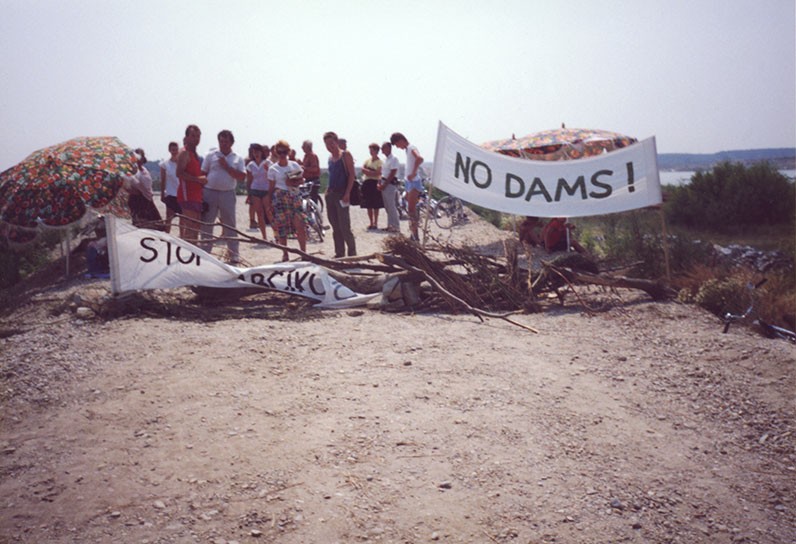
2016 április 13, 18:30
VARGHA JÁNOS előadása
(a Duna Kör alapító tagja)
The Danube Case in a Global Context
moderátor: Axel Braun (angolul)
Az esemény Axel Braun VALAMILYEN ELLENZÉK című kiállításához
kapcsolódó POLITIZÁLT TÁJ rendezvénysorozat része
Blinken OSA Archívum
Arany János utca 32
5051 Budapest
Janos Vargha's presentation discusses a selection of relevant topics that are related to dams worldwide. He will give overviews on history and politics of river engineering and hydropower development, scientific research and perception of social and ecological impacts of river regulation and damming as well as an introduction to river restoration versus hydropower development. Anti-dam movements, their success and failure, including the history and impacts of the World Commission on Dams (WCD) will be contextualised with the controversy about the Gabcikovo-Nagymaros Dam System. Furthermore he will refer to the recent hydropower development boom, its background and future impacts as well as the critical relation of climate change and hydropower development.
JÁNOS VARGHA
Environmentalist and photographer. He graduated in 1977 from the József Attila University, Szeged, with Master’s degree in biology. Since 1981 he has regularly published articles and delivered lectures about environmental issues of water management and water constructions. He is a founder of the Danube Circle, the first independent environmental protest group in the former communist block, recipient of the Right Livelihood Award (with the Danube Circle), the alternative Nobel-prize in 1985. In 1990, he was awarded with the Goldman Environmental Prize. He is the editor of a book, published in 1997, about the decision of the International Court of Justice in the Gabčíkovo-Nagymaros hydropower project’s case, and author of its chapter about hydropolitics. From 1998 he was the chief environmental advisor of the Hungarian government, but in 2000 he resigned from this position.
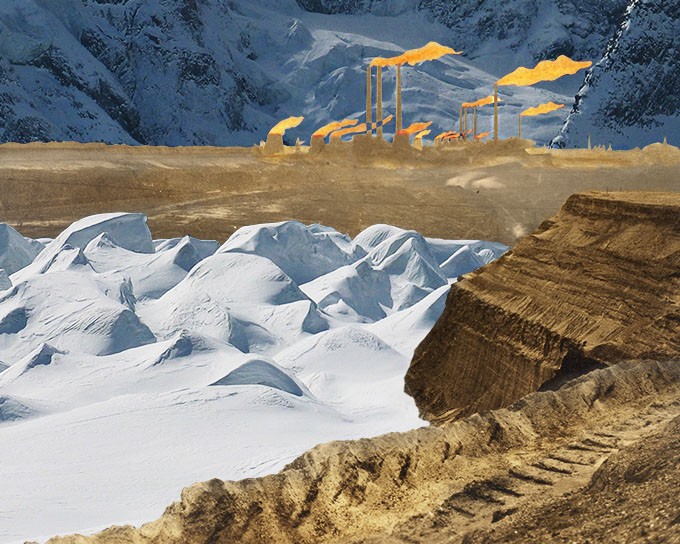
2016 április 14, 18:30
ALEX FISCHER előadása
(CEU, School of Public Policy, WWF Svájc)
Political lobbying – how to effectively impact on a policy process
moderátor: Axel Braun (angolul)
Az esemény Axel Braun VALAMILYEN ELLENZÉK című kiállításához
kapcsolódó POLITIZÁLT TÁJ rendezvénysorozat része
Blinken OSA Archívum
Arany János utca 32
5051 Budapest
For some observers, political lobbying is a euphemism for dubious interactions between big business and corrupt politicians. Others believe that lobbying is an essential component of a lively representative democracy. In any case, more resources are invested every year in the management of relations between various organizations and political decision-makers.
In recent years, the NGO sector, too, has started to professionalize its relationships with the political world.
This presentation has three aims: First, to discuss what lobbying is and how it works. Second, to provide some insights from NGO lobbying. Third, to discuss issues related to ethics of lobbying.
ABOUT ALEX FISCHER
Alex Fischer works as a head of the public affairs unit of WWF Switzerland. In addition he kept his affiliation with Central European University as Associate Professor. He served as full-time faculty member at the Department of Public Policy from 2005 until 2007.
From September 2000 to August 2005, he worked at the Swiss Graduate School of Public Administration, IDHEAP, in Lausanne, Switzerland. In parallel, he has also taught foreign and European Politics at the Universities of Berne and Fribourg, Switzerland.
Collage: Axel Braun, 2016